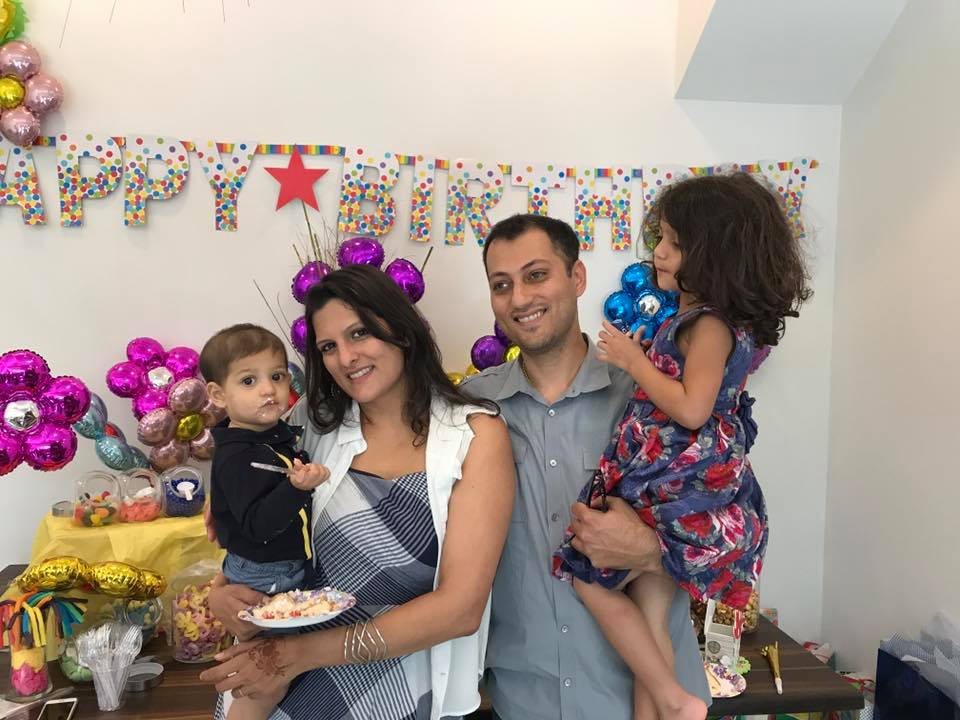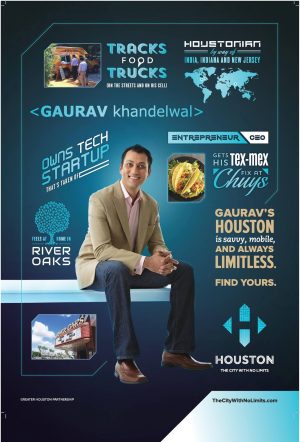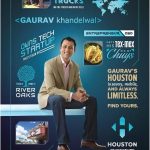Five Questions For … Gaurav Khandelwal, Founder of Houston’s Chai One

Houston—Houston tech entrepreneur Gaurav Khandelwal has been the face of Houston—literally.
In a marketing campaign a few years ago, Khandelwal was one of the featured ambassadors in a series of highway billboards. The Greater Houston Partnership effort was aimed at expanding the city’s image beyond the oil-and-gas stereotype.

Khandelwal, who grew up in Kolkata, India, and came to the United States as an undergraduate computer science student, is now the founder and CEO of Houston mobile app firm Chai One. “[I was] very much an introvert, how you expect computer science students to be,” he says.
But, in Houston, Khandelwal has adopted a more public profile, co-founding the coworking space Start Houston with real estate entrepreneur Apurva Sanghavi and being a vocal supporter of Houston as a home for technology companies.
At one point, Khandelwal and Sanghavi had plans to renovate an Art Deco building—a former headquarters of oil services company Schlumberger—for Chai One’s headquarters and to serve as a hub for other startups. But in the last year, Khandelwal bought out his partner and put the building up for sale. With Chai One rapidly expanding, he told the Houston Business Journal he needed bigger digs faster than the building could be renovated. In January, the building was sold to a preservationist.
In this week’s “Five Questions For …,” Khandelwal speaks about his aborted mission to become an Indian Air Force pilot, how thinking about the movie star Will Smith helped his visa prospects, and why he feels it’s important to help childhood education in India. Here is a lightly edited transcript of our conversation:
Xconomy: What’s your most impressive or most quirky skill that has nothing to do with your day job?
Gaurav Khandelwal: I like to visualize things, like an empty parking spot in front of a grocery store. I swear to you. I’ll get there and there will be an open spot. I gave a talk on this on Monday, around visualization for success. The talk was basically around being able to compel the universe and the metaphysical forces in the universe to work for you. If you just will it, by just constantly putting yourself in the world like it’s real, you will have it. If I want to hit a certain revenue number or goal, I see myself there and I’m in that alternative universe and I visualize that success.
When I was applying for college in the States, I didn’t have the money needed for me to pass the visa interview. [U.S. immigration officials] want you to prove ties back to the home country to know that you’ll come back. One of the ways they do that is to look at real estate you own, your wealth, what kind of money you have in the bank. We didn’t have any of that. For two years, I visualized myself—I had seen this movie, “Bad Boys”—driving a Porsche in New York City and being Will Smith every single night for two years. I visualized myself getting in a plane, going to the States.
When the day came for the interview for the visa, there were two windows, one where you submit your passport and the second where you were called for the interview. There were three or four people in line in front of me and the person before me got denied. They called my name and I looked toward the visa interview guy and he’s not looking at me; the guy that I submitted my passport to is calling me. I was worried that I submitted something wrong. The guy hands me my passport and said the visa’s been granted … with no interview. That I can’t explain. That’s where the belief comes from.
X: What did you want to be when you were a kid?
GK: I wanted to be an air force fighter plane pilot. A lot of kids want to be astronauts; space was definitely something of interest [to me]. I think I had seen before that to be an astronaut you have to know how to fly. I really enjoy fast-moving things, speed. So flying was something that seemed really exciting.
When I was 16, I applied [to] the Indian National Defence Academy to start studying toward that. My parents were dead against me going into the military, so they called the application center and they pulled the application. They basically said, “There is just no way that you’re doing this.” So that’s pretty much how it ended.
X: Where do you think your drive comes from?
GK: I think the drive just kind of comes from getting a high from solving problems. I’m constantly energized and motivated when I find opportunities where there’s a lot of pain that other people haven’t solved or thought about. That is just a ton of fun.
When I came for undergrad to the States, I just had money for one semester’s tuition. I went to a small private school and working on campus wasn’t going to be enough to make money to pay for tuition. I had to find ways to make money. Over four years, I started six different companies, a catering company, a pizza company, a software company, an HR company. I did some advertising work for the college newspaper—wherever I could find the best use of my time.
As an international student on campus, I was limited to working 20 hours a week; the minimum wage at the time was $5 an hour. There was no way I could make enough money. I didn’t want to go back to India. I had to run these different businesses. I realized I didn’t have all of the skills, so I ended up recruiting friends. For the catering company, I wasn’t good at cooking, so I’d bring in people as partners that were really good cooks.
There was no Indian restaurant in town, so we said we’ll cook for $10 a plate, and we need to have 20 people minimum. We would cook in the college dorm.
It was really my introduction to entrepreneurship. We got on the front page of the local newspaper, 19-year-old students making Indian food that was awesome and amazing. The dean basically said, “Where is your food permit? Where are you cooking this?” We don’t know about any of this stuff, so we shut it down.
X: If you could go back in time and get five minutes with any major historical figure, who would it be, and what would you want to say to them?
GK: I would go back to John D. Rockefeller, and I would ask, how did you realize you were in the railroad business, not the oil business? He knew he could drill all the oil he wanted but he knew if he couldn’t get it transported he couldn’t sell it. He was thinking massive scale, [not] just, “Let me sell a lot of oil.” It was about transportation and logistics, about the entire supply chain. He was a visionary, building three businesses at the same time. A lot of people have ideas, say, “I think I need to find a vendor, or find a team to do that,” but it’s hard to execute, even on one business. I would ask him, “How do you plan for three and execute all three in harmony?” The real question is, “When did you know you needed to build all three?”
X: How do you define success?
GK: “Happy wife, happy life.” She wears that T-shirt all the time.
To me, success is when you can positively impact or transform someone’s life that didn’t have an opportunity. So I’m involved in a couple of charities that are pulling out slum kids from India, educating kids in India. If you just look at the numbers, $25 or $30 a year pays for a kid’s annual education in India. I don’t think of success as a milestone—you’ve made a lot of money, you’ve reached some point in a career. I think that we need to be successful on a day-to-day basis.
I feel like the maybe it’s the borderline millennial in me. How do we change the world with everything that we do?
(17)





